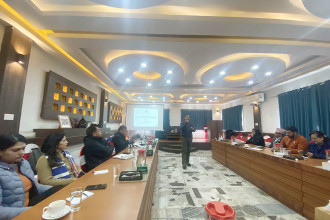
KATHMANDU: Confederation of Nepalese Industries (CNI) expects the monetary policy for fiscal year 2025/26, unveiled by Nepal Rastra Bank (NRB), to stimulate economic activity.
CNI said the decision to revise the working capital loan guidelines based on industry type, business nature and the loan repayment–income cycle was positive. However, it added that the revisions should also apply to productive industries, the construction sector and other businesses dependent on working capital loans. It welcomed NRB’s plan to study existing loan classification and loan-loss provisioning, and to adopt lending based on customer credit scores.
In a press statement issued by the CNI, the organisation noted that loans of up to Rs 30 million for industries near the Postal Highway and Mid-Hill Highway would be issued with a 2% premium on the base rate and count towards the specified sector for small and medium enterprises. It said this would help SMEs cope with current economic challenges. Similarly, loans of up to Rs 300,000 for youth going abroad for employment and up to Rs 500,000 for women would be classified as loans to the deprived sector. CNI said this would reduce capital pressure on banks and support investment.
The policy permits banks and financial institutions (BFIs) to invest in debentures issued by infrastructure-focused entities. CNI sees this as a partial response to the lack of infrastructure investment. It also welcomed NRB’s announcement to review the 15% dividend cap on microfinance institutions, saying the change would increase cash flow for investors and contribute, albeit modestly, to demand.
CNI said NRB had rightly acknowledged the private sector’s declining share in total fixed capital formation, attributing the contraction to weak market demand. It has urged the central bank to issue directives and guidelines to restore consumer confidence, boost demand and encourage private investment.
NRB has lowered the interest rate corridor: the upper limit from 6.5% to 6%, the lower limit from 3% to 2.75% and the policy rate from 5% to 4.5%. CNI said these cuts would stop interest rates from rising, support further reductions and increase loan demand. It added that NRB’s intention to issue bonds would provide investment alternatives and help manage structural liquidity in the banking system.
The policy allows banks to prioritise borrowers’ project analysis, skills and capacity in loan approval, encouraging a self-regulatory approach. CNI welcomed the shift from micro-management to supervisory oversight, saying it enables lending discretion at bank level.
The policy raises the loan ceiling for residential home construction and purchase from Rs 20 million to Rs 30 million. The loan-to-value (LTV) ratio is set at 80% for first-time buyers and 70% for others. CNI said this would improve sentiment, raise demand in the construction and building materials sectors, and increase government revenue. It said the increase in the single-customer limit for share-backed loans from Rs 150 million to Rs 250 million would also boost the capital market.
NRB has set a private sector credit expansion target of 12% for fiscal year 2025/26. The target for FY 2024/25 was 12.5%, but actual growth stood at around 8.5% by mid-June. With fiscal policy forecasting 6% growth next year, CNI is confident NRB will take additional measures as needed.
CNI said it expects NRB to issue directives addressing these matters and to consider structural reforms. These include moving from base rate to Marginal Cost of Funds-Based Lending Rate (MCLR) and External Benchmark Lending Rate (EBLR) for interest rate determination, and gradually reducing the directed sector lending requirement.





